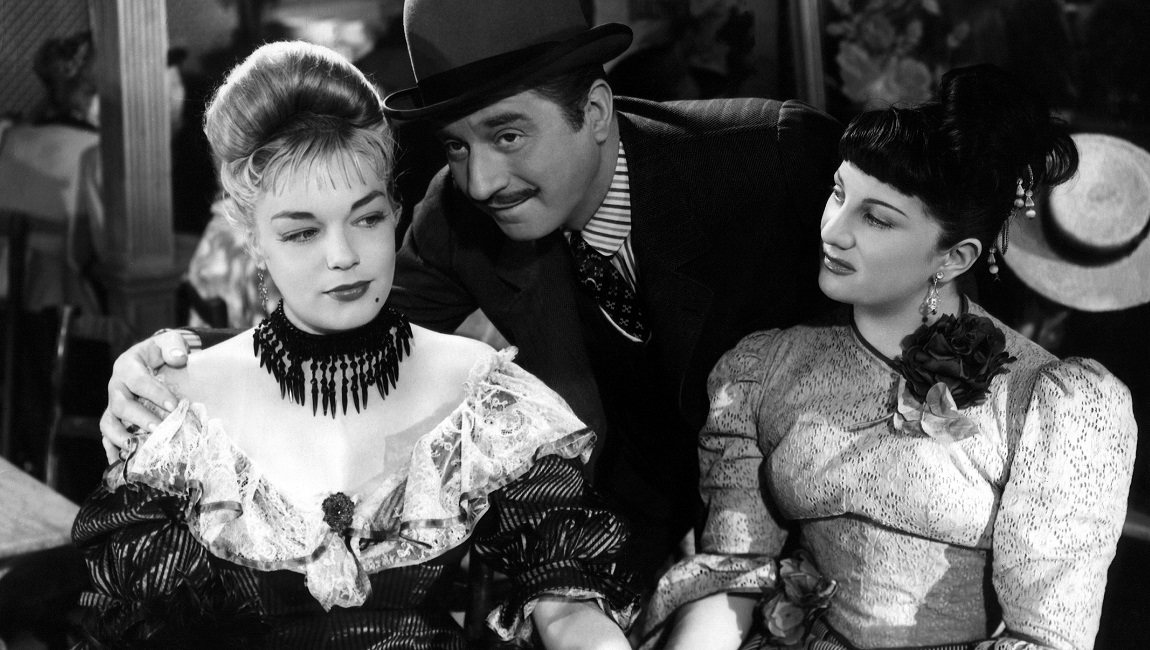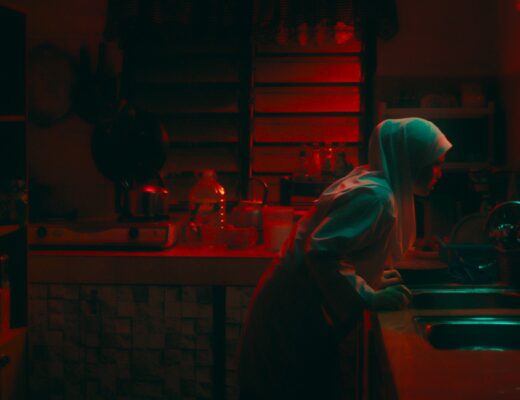“The mise-en-scène flexes emotion like you flex your muscles.”
So said Bertrand Tavernier of Jacques Becker’s Casque d’or, an observation applicable to the latter’s all too short directorial career, which exists as a roundelay of assuredly personal works, even if the respective material would suggest otherwise. His artistry, sinewy and fat-free, is like a further crystallization of the masterful control of his mentor, Jean Renoir; but where Renoir allowed chaos to encroach upon and influence such gracefulness — sometimes as a welcomingly optimistic means to an end — Becker never relented. Oftentimes, Becker’s characters react against chaos, erect routines of relative, ostensible stability, and project modestly attainable futures: Jean Gabin’s bedtime ritual in Touchez pas au grisbi, the steadfast, salt-of-the-earth artistry of eponymous pianist Édouard in Édouard et Caroline, the attempted reconciliation of itinerancy and domesticity in Montparnasse ‘19, Le Trou’s emphasized and cleanly delineated system for prison escape. Tragedy comes when there’s a break in this dam, an unalterable chain of events set in motion, and yet, that gracefulness is still preserved.
Tavernier also maintained that, in Casque d’Or, “the tragedy hits you frontally.” This doesn’t imply that Becker’s climaxes or penchant for emotionalism is perfunctorily enacted; the workings of his narratives are typically telegraphed from the outset, yet they are stowed away within the enveloping effortlessness of his filmmaking, so that the shock is only momentary, the realization of the transpiration of the inevitable lingering. So the Belle Epoque of this particular film is less belabored verisimilitude — remarkably, the film cycles through and returns to only a handful of locations — and more a streamlined tour of the respectively small worlds of its chosen subjects and their fatal intersections (even if it mostly derives from true-to-life police records). Georges Manda (Serge Reggiani), an ex-con turned carpenter, bumps into Raymond (Raymond Bussières), an old prison buddy, at the riverside cafe where the former has just built a modest stage for the band; Raymond is in attendance with his “coworkers,” the lackeys of the petty crime kingpin Leca (Claude Dauphin), among them the violent pretty-boy Roland (William Sabatier), who likes to smack around his girlfriend; also in attendance is the contrastingly luminous Marie (Simone Signoret). Georges and Manda share a beautiful, almost telepathically bonded dance, and thus the machinations of tragedy begin their work.
These smashed-together networks of carpenters, gangsters, molls, bar-workers, and the like share a common throughline: the pragmatic imploration to “not make a fuss.” The tenuous promises of the era animate Casque d’or, where murder can be ostensibly honorable, and leaving one relationship for another is enough to damage an underworld faction. The film’s indisputable centerpiece is the night spent at L’Ange Gabriel, a dive which houses the final skirmish between Manda and Roland, as well as introducing complacent upper-class tourists and police informants on the peripheries, a microcosmic rendering of that whole world just outside the bar. This shared ethos starts to crack when the physical difficulty and duration of killing another invites the gendarmes to move in. To keep everything running, either Manda or Roland has to be snubbed out, but the actual process, the cumbersome knife fight which predicts the absurd protractedness of that impossible death scene in Alfred Hitchcock’s Torn Curtain, isn’t as straightforward as the participants would like to think. Evidence piles up, bodies are half-heartedly hidden under some trash.
Becker’s impressive ability to deviate from a standard dramatic arc comes forth in what follows the L’Ange Gabriel set piece, where a countryside idyll shared by Manda and Marie comes after one of the initial blows to any sort of future they may have projected for themselves. If Becker’s project was the vicissitudes of inevitability, then Casque d’or’s sequencing is the sterling example, coaxing one into both states of pleasant observation and visceral subjectivity, though at mismatched intervals. The cushion of love is soon eviscerated by the combustibility of jealousy, as embodied by the insipid Leca, whose only veritable talent is to ingratiatingly convince others to do his work for him. The subtle double-crosses furnish this pointed avoidance of “fuss”, but Leca, Raymond, Manda, Marie, they can only stave off Becker’s gift for machine-like closure for so long.
Much of that tragedy that Tavernier speaks of derives from Becker’s unabashed affection for his characters, which results in frissons of unpredictability, as he’s also committed to the shape of his film as a whole. The camera evolves into a brusque apparatus by the finish, doing its best to keep pace with the actors, while also eschewing acts of violence with a cut that hinges on only a few seconds of screentime, that aforementioned pragmatism vaulting over the other collected moods once again. So, when Becker ends Casque d’or with a relatively prolonged shot of Manda and Marie dancing away from the camera, in the now-depopulated cafe where they first met, it plays like a gift, from director to audience.
Part of Kicking the Canon – The Film Canon.







